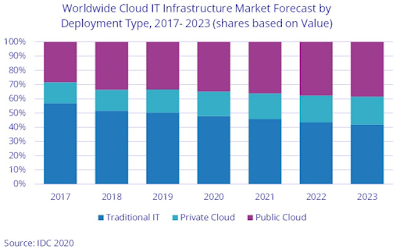
Hyperscale cloud providers are experiencing some market saturation. Vendor revenue from IT infrastructure products (server, enterprise storage, and Ethernet switch) for cloud environments, including public and private cloud, declined in the third quarter of 2019 (3Q19) as the overall IT infrastructure market continues to experience weakening sales following strong growth in 2018.
The decline of 1.8 percent year-over-year was much softer than in 2Q19 as the overall spend on IT infrastructure for cloud environments reached $16.8 billion, according to the latest market study by International Data Corporation (IDC).
As a result, IDC chose to slightly increase its forecast for total spending on cloud IT infrastructure in 2019 to $65.4 billion. This represents a flat performance compared to 2018.
Cloud IT infrastructure market development
The decline in cloud IT infrastructure spending was driven by the public cloud segment, which was down 3.7 percent year over year, reaching $11.9 billion; sequentially from 2Q19, this represents a 24.4 percent increase.
As the overall segment is generally trending up, it tends to be more volatile quarterly as a significant part of the public cloud IT segment is represented by a few hyperscale service providers. This softness of the public cloud IT segment is aligned with IDC's expectation of a slowdown in this segment in 2019 after a strong performance in 2018.
It is expected to reach $44 billion in sales for the full year 2019, a decline of 3.3 percent from 2018. Despite softness, public cloud continues to account for most of the spending on cloud IT environments.
However, as demand for private cloud IT infrastructure is increasing, the share of public cloud IT infrastructure continued to decline in 2019 and will be declining slightly throughout the forecast period.
Spending on private cloud IT infrastructure has shown more stable growth since IDC started tracking sales of IT infrastructure products in various deployment environments. In 3Q19, vendor revenues from private cloud environments increased 3.2 percent year-over-year, reaching nearly $5 billion. IDC expects spending in this segment to grow 7.2 percent year over year in 2019 to $21.4 billion.
As investments in cloud IT infrastructure continue to increase, with some swings up and down in the quarterly intervals, the IT infrastructure industry is approaching the point where spending on cloud IT infrastructure consistently surpasses spending on non-cloud IT infrastructure.
Until 3Q19, it happened only once, in 3Q18, and in 3Q19 it crossed the 50 percent mark for the second time since IDC started tracking IT infrastructure deployments. In 3Q19, cloud IT environments accounted for 53.4 percent of vendor revenues.
However, for the full year 2019, spending on cloud IT infrastructure is expected to stay just below the 50 percent mark at 49.8 percent. This year (2020) is expected to become the tipping point with spending on cloud IT infrastructure staying in the 50+ percent range.
Across the three IT infrastructure domains, Ethernet switches is the only segment expected to deliver visible year-over-year growth in 2019, up 11.2 percent, while spending on compute platforms will decline 3.1 percent and spending on storage will grow just 0.8 percent. Compute will remain the largest category of cloud IT infrastructure spending at $34.1 billion.
Sales of IT infrastructure products into traditional (non-cloud) IT environments declined 7.7 percent from a year ago in 3Q19. For the full year 2019, worldwide spending on traditional non-cloud IT infrastructure is expected to decline by 5.3 percent.
By 2023, IDC expects that traditional non-cloud IT infrastructure will only represent 41.9 percent of total worldwide IT infrastructure spending (down from 51.6 percent in 2018). This share loss and the growing share of cloud environments in overall spending on IT infrastructure is common across all regions.
According to the IDC assessment, while the industry overall is moving toward greater use of cloud, there are certain types of workloads and business practices, and sometimes end user inertia, which keep demand for traditional dedicated IT infrastructure afloat.
Outlook for cloud infrastructure investment growth
Geographically, the cloud IT Infrastructure segment had a mixed performance in 3Q19. Declines in the U.S. market, Western Europe, and Latin America were driven by overall market weakness; in these and some other regions 3Q19 softness in cloud IT infrastructure spending was also affected by comparisons to a strong 3Q18.
In Asia-Pacific (excluding Japan), the second-largest geography after the U.S. market, spending on cloud IT infrastructure increased 1.2 percent year-over-year, which is low for this region. However, it is in comparison with strong double-digit growth in 2018. Other growing regions in 3Q19 included Canada (4.9 percent), Central & Eastern Europe (4.6 percent), and Middle East & Africa (18.1 percent).
Long-term, IDC expects spending on cloud IT infrastructure to grow at a five-year compound annual growth rate (CAGR) of 7 percent, reaching $92 billion in 2023 and accounting for 58.1 percent of total IT infrastructure spend. Public cloud datacenters will account for 66.3 percent of this amount, growing at a 6 percent CAGR. Spending on private cloud infrastructure will grow at a CAGR of 9.2 percent.
 Interested in hearing industry leaders discuss subjects like this and sharing their experiences and use-cases? Attend the Cyber Security & Cloud Expo World Series with upcoming events in Silicon Valley, London and Amsterdam to learn more.
Interested in hearing industry leaders discuss subjects like this and sharing their experiences and use-cases? Attend the Cyber Security & Cloud Expo World Series with upcoming events in Silicon Valley, London and Amsterdam to learn more.
